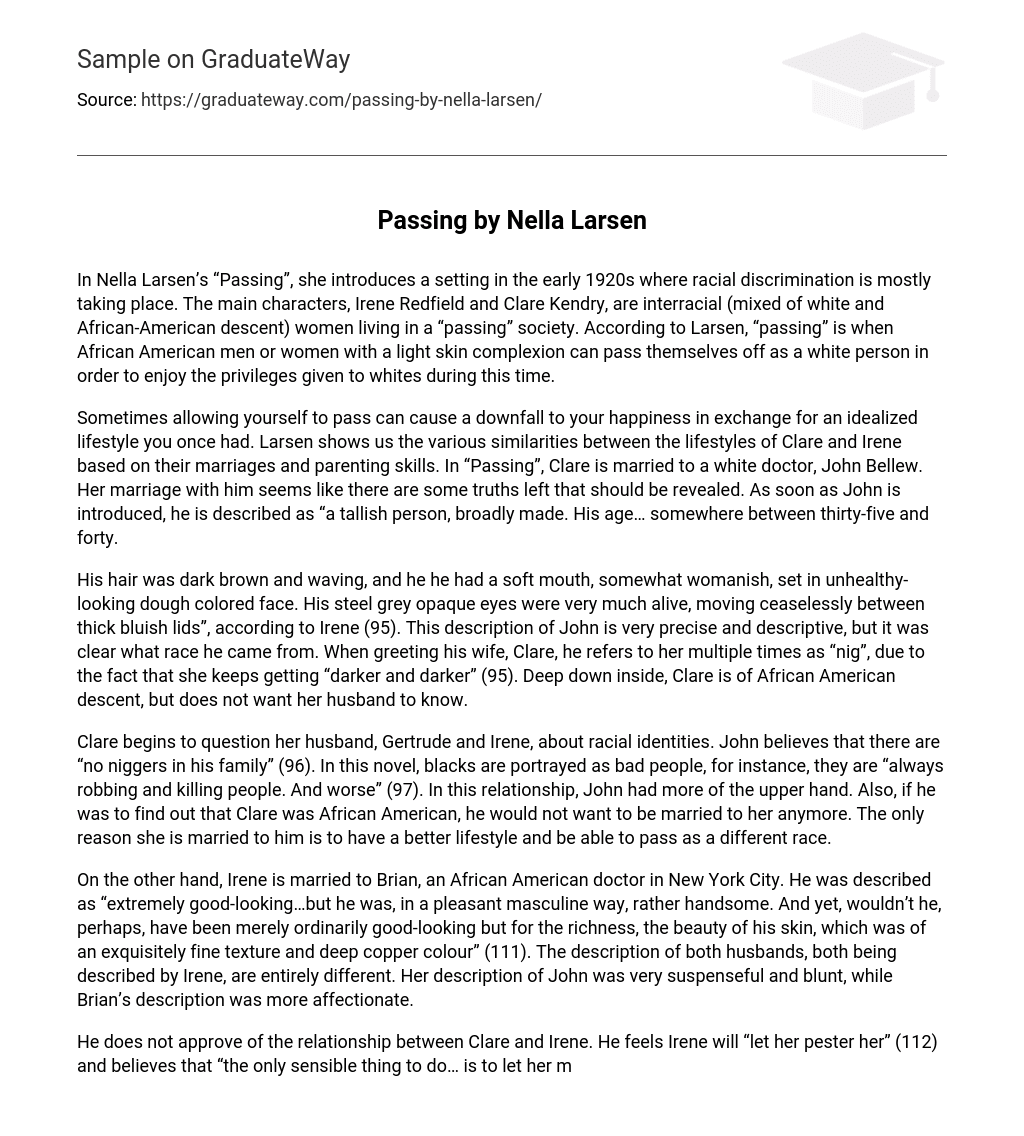In her novel “Passing”, Nella Larsen depicts a setting in the early 1920s characterized by predominant racial discrimination. The story revolves around two main characters, Irene Redfield and Clare Kendry, who are women of mixed white and African-American heritage living in a society that practices “passing”. Larsen defines “passing” as the act of African-American individuals with a fair skin tone presenting themselves as white in order to benefit from the privileges bestowed upon white people during this era.
Paraphrasing and unifying the text:
Sometimes, choosing to pretend and hide one’s identity can lead to the downfall of one’s happiness in exchange for an idealized lifestyle that was once enjoyed. In her novel “Passing”, Larsen highlights the many similarities between Clare and Irene’s lives, particularly in terms of their marriages and parenting abilities. Clare, who is married to a white doctor named John Bellew, conceals some truths about her marriage that should be unveiled. When John first appears in the story, he is described as a somewhat tall and broad-built man, estimated to be between the ages of thirty-five and forty.
According to Irene (95), John had dark brown and waving hair, with a soft mouth that appeared somewhat womanish, all set in an unhealthy-looking dough colored face. His steel grey opaque eyes were constantly moving between thick bluish lids, giving them a lively appearance. This description provides precise and descriptive details about John’s appearance, except for his racial background. When addressing his wife, Clare, he repeatedly refers to her as “nig” because she keeps getting “darker and darker” (95). Clare secretly identifies as African American but chooses to hide this knowledge from her husband.
Clare begins questioning her husband, Gertrude, and Irene about racial identities. John claims that there are “no niggers in his family” (96). The novel portrays blacks as bad people; they are continuously associated with robbery, murder, and other atrocities (97). John holds more power in their relationship and would refuse to be married to Clare if he discovered her African American heritage. Clare is only married to him for a better lifestyle and the ability to pass as a different race.
Irene is married to Brian, an African American doctor in New York City. According to Irene, Brian is described as “extremely good-looking…but he was, in a pleasant masculine way, rather handsome. And yet, wouldn’t he, perhaps, have been merely ordinarily good-looking but for the richness, the beauty of his skin, which was of an exquisitely fine texture and deep copper colour” (111). The description of both husbands, given by Irene, differs greatly. Irene’s depiction of John was suspenseful and direct, whereas her portrayal of Brian was more loving.
According to him, Clare and Irene’s relationship is disapproved of. He believes that Irene will allow Clare to bother her and thinks that the best course of action is to let Clare miss Irene. The main point of contention between Irene and Brian is their children, Ted and Junior. Junior is described as resembling his father in appearance but having his mother’s practical and determined temperament, while Ted is characterized as being more introspective and less assertive in his thoughts and desires.
During dinner, Ted and Junior found themselves engrossed in a discussion about the lynching of people of color. Brian provided information on the topic, while Irene tried to avoid the conversation. Irene expressed her wish for Brian to refrain from discussing lynching in front of Ted and Junior, considering it inappropriate for dinner and suggesting that they should learn about such horrific things when they are older (169). Disagreeing with Irene’s stance, Brian vehemently stated, “You’re completely mistaken!”
If, as you’re so determined, they must reside in this accursed country, they ought to discover the kind of challenges they will face as soon as possible. The sooner they acquire this understanding, the more prepared they will be” (169). Irene desires for her children to mature without any knowledge of the racial reality until they are older and capable of comprehending it more effectively. Conversely, Brian wants his children to learn earlier rather than later because they should be conscious of what lies ahead for them. Irene always worries about her sons.
According to Brian, he believes that Irene constantly worries about their children. Brian reassures Irene that their children are doing well and Junior, in particular, is strong and healthy. I believe that Brian spends more time with the children compared to Irene, which allows him to have a better understanding of their mental and physical well-being. In contrast, Margery, Clare’s daughter, is not mentioned frequently in the novel. Margery is studying in Switzerland and Irene reminds Clare of how delighted she will be to see her after being apart for an extended period.
In her response, Irene expresses that there are other things in the world besides children, although she acknowledges that some people may not realize this fact (143). Irene finally acknowledges her dedication to being a mother and admits that she is fully consumed by taking care of her boys and managing her household (143). This prompts Clare to acknowledge Irene’s kindness towards her household and herself, indicating that Clare desires the lifestyle that Irene leads. According to Larsen, Irene and Clare have differing lifestyles. While Clare’s life is perceived to be good because she has everything she wants, it is not necessarily synonymous with happiness.
Irene and Clare both aspire to an authentic and genuine life, which is what Clare admires about Irene. One important similarity in their marriages and parenting is their shared desire for happiness and improvement for their families. Brian wants their children to be aware of the society they reside in, but they often have disagreements regarding their children. Clare is submissive to Jack and lacks interest in their child, allowing him to take the lead. Passing brings both advantages and disadvantages.





